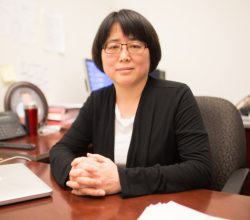
Dr. Anjali Awasthi
Professor
Dr. Anjali Awasthi is Full Professor and Concordia University Research Chair (Tier-II) in Connected Sustainable Mobility Systems at Concordia Institute for Information Systems Engineering (CIISE), at Concordia University, Montreal. Her areas of research are modeling and simulation, data mining, Information Technology, and decision-making, sustainable logistics planning, quality assurance in supply chain management, and sustainable supply chain management.

Dr. Chun Wang
Professor
Dr. Chun Wang received a Ph.D. from the University of Western Ontario in 2008 for his work in economic models for decentralized scheduling. His research interests include decentralized, stochastic scheduling models, data-driven optimization, machine learning and their application to intelligent transportation systems, mobility as a service, community healthcare management, and resource allocation in wireless communication networks.

Dr.Jun Yan
Associate Professor
Dr. Jun Yan is an Associate Professor at the Concordia Institute for Information Systems Engineering (CIISE) of Concordia University, Montréal, Canada. His research interests include machine intelligence, security, and resilience in smart and critical infrastructures. His research has been enabled and empowered by a group of intelligent and diligent researchers at Concordia University.

Dr. Fereshteh Mafakheri
Assistant Professor
Dr. Fereshteh Mafakheri is an assistant professor at École nationale d’administration publique (ENAP), Université du Québec. She is also an affiliated assistant professor at the Gina Cody School of Engineering at Concordia University. She is directing Decision Modeling & Analytics Laboratory (DeciMAL). Fereshteh has a mixed background in engineering and management disciplines, helping her to target multidisciplinary research activities, and in particular, bridging the socioeconomic, policy, and technological challenges in the energy sector and public service domain.

Dr.Tsz Ho Kwok
Associate Professor
Dr. Tsz Ho Kwok is a Tier II Concordia University Research Chair (CURC) in the Department of Mechanical, Industrial, and Aerospace Engineering. He is working on areas including 3D printing, design for additive manufacturing, topology optimization, generative design, mass customization, CAD/CAM, advanced/traditional manufacturing, geometric and solid modeling, robotics, computer vision, image processing, machine learning, and medical devices.

Dr. Nadia Bhuiyan
Professor
Dr. Nadia Bhuiyan is an Associate Director at Concordia Institute for Aerospace and Design Innovation (CIADI). Her research focus is on product development processes, dealing with the design, development, production, and distribution of goods and services, with a focus on emerging tools and techniques for integrating design and manufacturing to improve process performance. She is currently conducting research on the application of lean manufacturing principles in product development.

Dr.Hua Ge
Professor
Dr. Hua Ge is a Tier II Concordia University Research Chair (CURC) in High-Performance Building Envelope for Climate Resilient Buildings. Her expertise is in large-scale laboratory testing, field monitoring and modeling of the hydrothermal performance of building envelopes, quantifying wind-driven rain loads by field measurements and CFD modeling, and low-energy buildings. Her current research interests include the impact of climate change on wind-driven rain loads, urban microclimate and building performance; climate resilience building envelopes; dynamic building facades; and low-carbon healthy buildings.
Dr. Hua Ge is a Tier II Concordia University Research Chair (CURC) in High-Performance Building Envelope for Climate Resilient Buildings. Her expertise is in large-scale laboratory testing, field monitoring and modeling of the hydrothermal performance of building envelopes, quantifying wind-driven rain loads by field measurements and CFD modeling, and low-energy buildings. Her current research interests include the impact of climate change on wind-driven rain loads, urban microclimate and building performance; climate resilience building envelopes; dynamic building facades; and low-carbon healthy buildings.